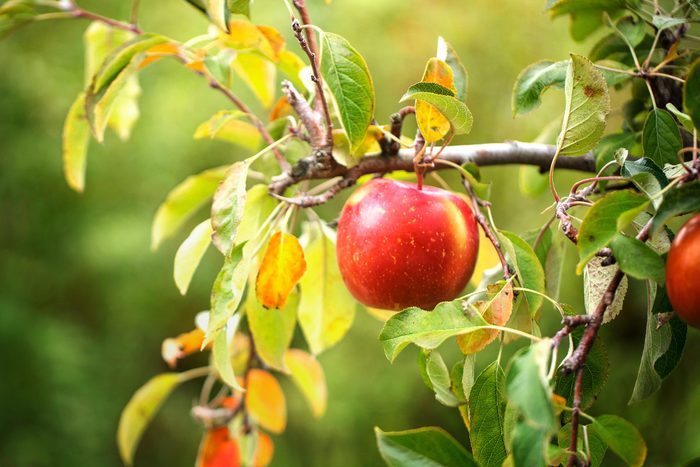Eating This Every Day May Help Fight Dementia, Says New Study
Updated: Jul. 21, 2024

An apple a day? Quite possibly: research has linked a particular category of foods with improved brain health, among more impressive benefits.
While dementia, frontotemporal dementia and cognitive decline can happen because of a variety of factors, such as genetics, there’s a lot of research that indicates particular daily habits have a major impact on your brain health. Exercise—even as simple as going for a walk—can make a big difference, as well as mental stimulation and, of course, eating a healthy diet. Plus, thanks to recent research, a particular set of foods has been linked with fighting dementia and cognitive decline.
Neurology Professors Just Listed the 9 Worst Habits for the Human Brain
The research, published in November 2022 in the peer-reviewed journal Neurology, found that those who eat a diet high in flavanols can slow down the rate of cognitive decline. To make this conclusion, researchers divided 961 adults with an average age of 81 into five groups, based on their flavanols intake. The lowest group averaged around five milligrams of flavanols a day, while the highest group averaged 15 milligrams.
After adjusting for other factors related to cognitive decline such as age, sex, and smoking, the study concluded that the group with the highest intake of flavanols saw a higher decline rate for warding off dementia compared to the other groups. Researchers say the connection is likely due to the antioxidant and anti-inflammatory properties that flavanols possess.
Over 40? Here Are 9 Clever Memory Exercises to Start Doing Today
What are flavanols?
Flavanols, also known as flavan-3-ols, are a set of antioxidant compounds found in plant-based foods and beverages. These antioxidants are known for reducing inflammation in the body—which has repeatedly been demonstrated to trigger several chronic diseases—while flavanols also reduce oxidative stress, which can cause further damage to the body.
“Flavanols have antioxidative properties,” says Lauren Manaker, MS, RDN, LDN, CLEC, CPT based in Charleston, South Carolina. “Oxidative stress that can naturally occur due to lifestyle choices and environmental impacts, over time, may negatively impact brain health. Flavonols with antioxidant properties may help combat oxidative stress, and thus, support brain health.”
The One Major Effect Walking Has on Your Dementia Risk, Says Research
How foods with flavanols can slow down cognitive decline
New York City-based biochemist Marc Milstein, PhD, author of The Age-Proof Brain, points out that oxidation and inflammation can damage brain cells. This can lead to brain dysfunction and eventually, memory loss. The anti-inflammatory and antioxidant properties of flavanols can help fight off both, as they protect nerve cells as well as the brain.
Dr. Milstein points out that this isn’t the first time research has made the connection between flavanols and cognitive decline. “Yes, this [study] is consistent with several studies that suggest flavanols are beneficial for brain health,” he says. He also points to another 2020 study, published in The American Journal of Clinical Nutrition, which found long-term intake of foods with flavanols lowered the risk of Alzheimer’s disease. An earlier 2009 review in Genes & Nutrition made the same conclusion, finding how flavanols-rich foods can limit neurodegeneration and prevent or reverse cognitive decline.
Along with their anti-inflammatory and antioxidant properties, flavanols also protect the noggin by increasing blood supply to the brain cells. “Basically, these foods send signals to send more oxygenated blood to brain cells,” says Dr. Milstein. “Oxygen is fuel to brain cells.”
Eating These Foods Can Lead to Premature Death, Says New Study
Flavanols support many other functions
While slowing cognitive decline is enough of a reason to add more foods with flavanols to your diet, both Manaker and Dr. Milstein highlight other ways these bites can benefit important functions that are key to your wellness. “Flavonols not only support brain health, [but] data also suggests that intake may be linked to many heart-health benefits, including healthy blood pressure and healthy cholesterol,” says Manaker.
The American Heart Association backs this up, as increasing research shows that many nutritional practices good for the heart health are also often good for the brain. A diet rich in flavanols is one key for both. Why this link? “We see that heart health is critical for brain health, as the heart is responsible for supplying the brain with oxygen,” says Dr. Milstein. “Thus, foods that promote heart health are also crucial for the brain.”
Dr. Milstein also connects the intake of flavanols with improved gut health, which is key for keeping the brain healthy. “Inflammation can start in the gut and spread to the brain,” he says. “These anti-inflammatory flavanols can lessen inflammation in the gut and thus protect the brain.”
Manaker also points out that some research even shows the ways flavanols—specifically, flavanols consumed from cocoa—can improve the health of one’s skin by positively affecting skin elasticity and preventing wrinkles, according to a 2016 study that was published in The Journal of Nutrition.
Practicing This Feeling Could Actually Help You Live Longer, Says a Neuroscientist
Flavanol-rich foods to add to your diet
So what exactly constitutes 15 milligrams of flavanols a day? Actually, getting this from your meals is pretty simple. For example, one cup of dark, leafy greens—like kale or arugula—actually contains that exact amount.
Some of the most powerful sources of flavanols come from tea (over 100 milligrams per cup of black or green tea), cocoa (ranging between 100 to 2,000 milligrams per three-ounce bar of dark chocolate), as well as lots of fruits and vegetables. “People can enjoy foods and drinks like 100% orange juice, true tea, apples, kale, berries, and tomatoes to include this important component in their diet,” she says. She adds that onions, spinach, and asparagus are all powerful sources of flavanols that can amp up the health factor in your meals.




















